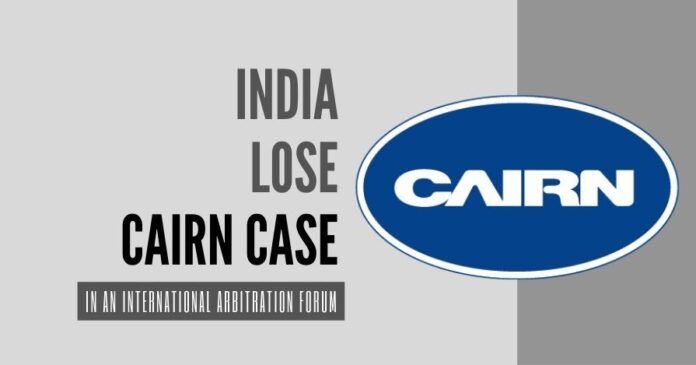
Foreign investors will watch the government’s response to both the Cairn and Vodafone awards
Another day, another case lost by India in the international forums. The India Government (GOI) lost its case in International Arbitration with Cairn Energy and has been ordered to pay 1.4 billion dollars (around Rs.10,400 crores) in a tax case. The question that looms large is why India repeatedly loses cases in International Arbitration forums. On the last day (December 24), the Finance Ministry decided to file an appeal in the Vodafone case against another International Arbitration forum’s order which put a fine and told to pay legal fees of around 5.3 million dollars to Vodafone.
The problem is the duplicity of Government of India for agreeing to International Arbitration forums when these multinationals are doing business in India, where the companies are supposed to adhere to Indian rules. But sometimes GOI prefers bilateral trade agreements and puts the cases out of Indian laws – and thus gets humiliated abroad. Only corporates and their fat cat advocates mint money in these arbitration forums. The worst is that in both cases the orders were unanimous as India’s nominee in arbitration also went against India!
The Government of India was asked to compensate Cairn “for the total harm suffered” together with interest and cost of arbitration, according to the order.
PGurus has published a series of reports on the dubious games in the Vodafone’s International arbitration case. The reports can be accessed from this link[1].
Cairn case
On December 23, India has been ordered to return up to USD 1.4 billion to Cairn Energy PLC of UK after an international arbitration overturned tax demanded retrospectively. The three-member tribunal, which also comprised of a nominee of the Indian government, unanimously ruled that India’s claim of Rs.10,247 crores in past taxes over a 2006-07 internal reorganization of Cairn’s India business was not a valid demand. The tribunal ordered the government to desist from seeking such a tax and return the value of shares it had sold, dividends seized and tax refunds withheld to recover the tax demand. The Government of India was asked to compensate Cairn “for the total harm suffered” together with interest and cost of arbitration, according to the order.
While the order does not contain a provision for challenge or appeal against the award, the government said it will study the arbitration award and “will consider all options and make a decision on the further course of action, including legal remedies before appropriate fora.” Legal experts say Cairn can use the arbitration award to approach courts in countries such as the UK to seize any property owned by India overseas to recover the money if the award is not honoured.
Second loss, after Vodafone
This is the second loss the government has suffered in three months over the retrospective levy of taxes. In September, UK’s Vodafone Group won an international arbitration against the demand of Rs.22,100 crores in taxes. However, Cairn was the only company against which the government took action to recover retrospective taxes. During the pendency of the arbitration, the government sold Cairn’s near 5 per cent holding in Vedanta Ltd, seized dividends totalling Rs.1,140 crores due to it from those shareholdings and set off a Rs 1,590-crore tax refund against the demand.
Besides Cairn Energy, the government also slapped a similar tax demand on its erstwhile subsidiary Cairn India (which is now part of Vedanta Ltd). Cairn India too has challenged the demand through a separate arbitration. In the case of Vodafone, the government took no such action.
Cairn Energy in 2010-11 sold Cairn India to Vedanta but held a small stake in the firm, which was sold by the tax department to partly recover the tax demand.
Foreign investors will watch the government’s response to both the Cairn and Vodafone awards. The BJP government and its ministers have in the past denounced the introduction of a retrospective tax amendment in 2012 by the previous Congress government as tax terrorism. Cairn had challenged the Indian government seeking taxes over an internal business reorganization using the 2012 retrospective tax law, under the UK-India Bilateral Investment Treaty.
Cairn Energy, which gave the country its biggest oil discovery, was in March 2015 slapped with a tax demand of Rs.10,247 crores over alleged capital gains it made by re-organizing its India unit into a separate subsidiary for listing on local stock exchanges. Cairn Energy in 2010-11 sold Cairn India to Vedanta but held a small stake in the firm, which was sold by the tax department to partly recover the tax demand.
Italian marines’ case
It was an abject surrender of Government of India for agreeing for international arbitration in a criminal case where two Italian marines were arrested for killing Indian fishermen. Both Congress and BJP governments did treachery in this case by saving the accused Italian marines from Indian criminal laws[2].
References:
[1] Vodafone case – is it time for the Government to introspect? – Sep 28, 2020, PGurus.com
[2] Treachery of Congress and BJP Governments in Italian Marines case – Jul 03, 2020, PGurus.com
- Prime Minister Narendra Modi: A Gujju businessman who does not invest his precious time for a losing battle - April 13, 2024
- NIA arrests two accused Shazib and Taahaa in Bengaluru’s Rameshwaram Cafe blast case from Kolkata - April 12, 2024
- National Herald scam: Adjudicating Authority upholds Rs.752 crore assets attached by ED - April 11, 2024











[…] खबर को अंग्रेजी में यहाँ […]